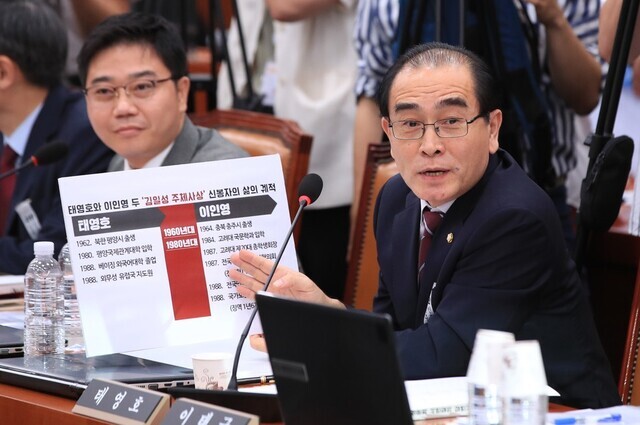hankyoreh
Links to other country sites 다른 나라 사이트 링크
[Editorial] Thae Yong-ho’s ideological attack on Lee In-young was indefensible and anachronistic

Thae Yong-ho and other lawmakers with the United Future Party (UFP) tarnished the confirmation hearing for unification minister nominee Lee In-young on July 23 with ideological attacks that truly crossed the line. They even went so far as to demand a public declaration of “ideological conversion.” Their remarks went beyond the level of the ridiculous to reach the realm of the stupefying. We cannot help wondering just how long the UFP plans to carry on with such unconstitutional antics.
Thae, a defector from North Korea, said during the hearing that day that he had “examined the course of [Lee’s] life while preparing [for the hearing] and could not find when or where he underwent an ideological conversion.” Declaring that he himself had “cried ‘hurrah for the Republic of Korea’” after defecting, Thae wondered, “When and where did the nominee ever say that he had abandoned Juche [North Korean communism] ideas or declare that he was not a believer in Juche philosophy?” In response, Lee said, “This so-called ‘conversion’ is something that applied to people who defected from the North to the South.” He also stressed, “Scrutinizing ideas and compelling an ‘ideological conversion’ are different matters.” But Thae only continued to press Lee for a public “conversion.” “Are you still a believer in 'Juche [Self-Reliance]' Ideology or not?” he asked. “Can you declare to the public that you have cast them aside?” This sort of anachronistic behavior is not something we can simply ignore.
The term “ideological conversion” has its roots in a system introduced during the Japanese occupation to monitor independence activists. After liberation, dictatorship governments continued to force ideological conversions on prisoners of conscience charged with National Security Act violations. This led to an ongoing tragedy as prisoners who did not convert died under torture or were forced to suffer even longer prison sentences than Nelson Mandela. It was only in 1998 that the ideological conversion system was abolished under the Kim Dae-jung administration. This abolition appeared to reflect a societal consensus that Article 19 of the Constitution concerning “freedom of conscience” also encompassed the principle that no one should be compelled to reveal his or her ideas.
Thae may have been so caught up in the framework of his own experience of having to prove his “conversion” after defecting that he did not predict the ramifications of his actions. But it’s difficult to fathom his rationale in claiming “pressure on opposition party lawmakers” when Lee and ruling Democratic Party committee members at the hearing commented multiple times on the unconstitutional nature of his line of questioning. Unless he reflects and apologizes, there will need to be stern consequences for his actions at the National Assembly level. Fellow UFP lawmakers Park Jin and Cho Tae-yong not only did nothing to stop his loose cannon tactics, but actively contributed to the ideological attacks, bringing up Lee’s activities as chairperson of the National College Students’ Council when he was a student. The UFP needs to stop with these political tactics that rehash the same ideological strictures the dictatorships of old used to employ.
Please direct comments or questions to [english@hani.co.kr]

Editorial・opinion
![[Column] Has Korea, too, crossed the Rubicon on China? [Column] Has Korea, too, crossed the Rubicon on China?](https://flexible.img.hani.co.kr/flexible/normal/500/300/imgdb/original/2024/0419/9317135153409185.jpg) [Column] Has Korea, too, crossed the Rubicon on China?
[Column] Has Korea, too, crossed the Rubicon on China?![[Correspondent’s column] In Japan’s alliance with US, echoes of its past alliances with UK [Correspondent’s column] In Japan’s alliance with US, echoes of its past alliances with UK](https://flexible.img.hani.co.kr/flexible/normal/500/300/imgdb/original/2024/0419/2317135166563519.jpg) [Correspondent’s column] In Japan’s alliance with US, echoes of its past alliances with UK
[Correspondent’s column] In Japan’s alliance with US, echoes of its past alliances with UK- [Editorial] Does Yoon think the Korean public is wrong?
- [Editorial] As it bolsters its alliance with US, Japan must be accountable for past
- [Guest essay] Amending the Constitution is Yoon’s key to leaving office in public’s good graces
- [Editorial] 10 years on, lessons of Sewol tragedy must never be forgotten
- [Column] A death blow to Korea’s prosecutor politics
- [Correspondent’s column] The US and the end of Japanese pacifism
- [Guest essay] How Korea turned its trainee doctors into monsters
- [Guest essay] As someone who helped forge Seoul-Moscow ties, their status today troubles me
Most viewed articles
- 1[Column] The clock is ticking for Korea’s first lady
- 2Samsung barricades office as unionized workers strike for better conditions
- 3[Editorial] When the choice is kids or career, Korea will never overcome birth rate woes
- 4S. Korea, Japan reaffirm commitment to strengthening trilateral ties with US
- 5[News analysis] After elections, prosecutorial reform will likely make legislative agenda
- 6Japan officially says compensation of Korean forced laborers isn’t its responsibility
- 7[Editorial] As it bolsters its alliance with US, Japan must be accountable for past
- 8[Editorial] Does Yoon think the Korean public is wrong?
- 9Why Israel isn’t hitting Iran with immediate retaliation
- 10[Interview] Learning about the Sewol tragedy through BTS